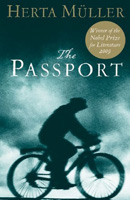

Serpent's Tail, paperback, 9781852421397
In this novella, Herta Müller paints a bleak picture of life in Nicolae Ceausescu's Romania, a world where men drink their paychecks away, striking miners are sent to freeze at a mountaintop sanatorium, and women prostitute themselves to survive or escape. The protagonist, Windisch, a member of the German minority, desperately seeks the passport that will allow himself and his family to emigrate.
Müller imbues this world with an unreal, folktale-like quality. In the opening, a thicket of roses obscures the war memorial, the church is locked, and the night watchman at the mill is sleeping, dreaming of a frog, which is his wife. Windisch sees the world through windows and distorted reflections; he stares through a neighbor's window at a picture of an old woman, now dead. Müller's short, spitting sentences convey the simple poetry of an oral storytelling style, underpinned by weary anger.
Müller's use of color is fascinating. Much of this world is a blind and blinding white, dimly illumined by grey light and shadowed with flashes of black. A few objects are red, the color of blood; blue, the color of freezing flesh and blood inside the body; or brown, the color of a passport. Yellow and violet are first mentioned during the funeral rites for the Widow Kroner. Green, the color of life and hope, is connected either with the notion of escape, or, crushingly, with violence. Windisch goes to the greenhouses in search of the gardener, who might be able to provide him with a passport; an old woman carves a green melon, which emits a "death rattle," and scoops into the red flesh inside, the red water dripping from her mouth.
Time appears to be at once cyclical and at a standstill. Again and again, Windisch returns to the mill, hitting the same pothole along the way. He feels time standing still for those who stay in the village; he feels the end of time everywhere. No one in the village hopes for any positive change. When the night watchman remarks that the owl, which brings death to a household by lighting on its roof, may be dying, Windisch replies, "If it dies, another owl will come to the village. A stupid young owl that doesn't know anything. It will sit on anyone's roof."
In this fragmented world, brutality and disconnectedness are the norm. Before the war, there was
an apple tree in the village that ate its own apples. The villagers burned this tree where it stood
in the churchyard. The description of the bursting, sizzling flesh of the apples and the acrid smoke
is horrifying. Later, the night watchman eats a green apple as he speaks hatefully of Romanian
Baptists, Jews, and women; unsurprisingly, the apple is full of worms. While Müller's plot is
simple, there is hidden meaning everywhere, and the style, symbolism, and imagery make this bleak
tale unforgettable.